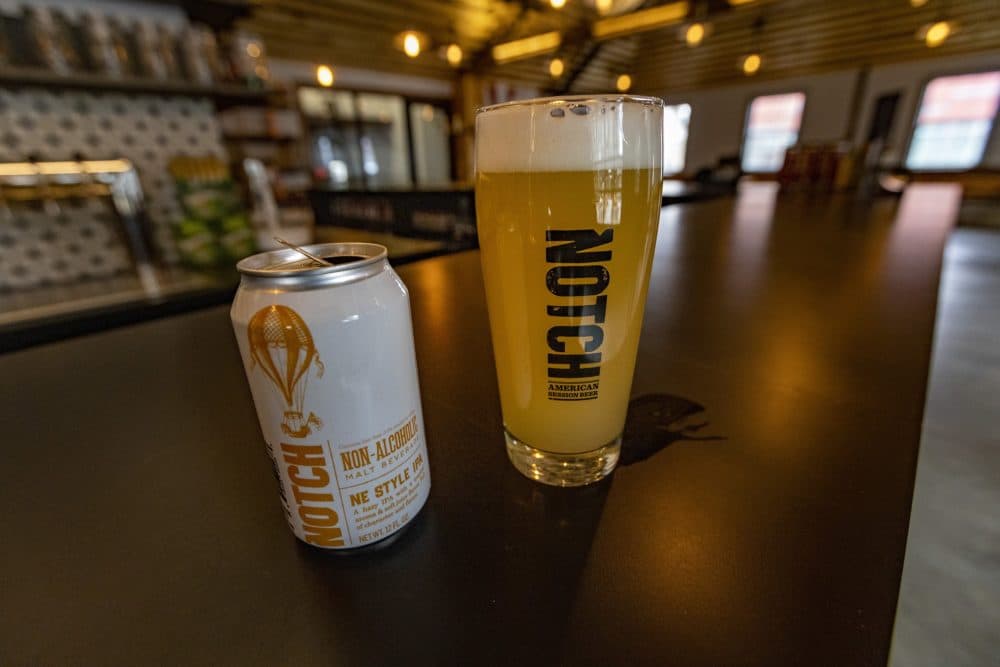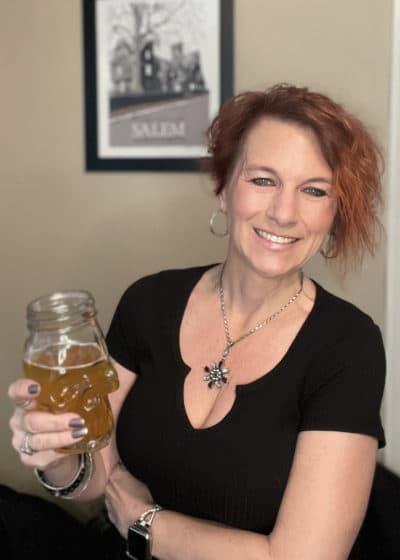Advertisement
Nonalcoholic beer's bad reputation shifts as craft brewers join a booming trend
Resume
Many people are in the middle of Dry January, a month-long break from alcohol. Others have opted to lead a sober lifestyle yearound. In the past it's been challenging for avid beer geeks doing either to find nonalcoholic alternatives that satisfy their quests for interesting flavors. But more craft brewers — many who've been skeptics — are joining a booming trend.
And really, who could blame their dubiousness? Nonalcoholic beer has suffered a pretty bad rep in the United States for decades.
“Nonalcoholic beer has been the dusty bottles in supermarket markets next to the mixers in some aisle you never go down,” Chris Lohring said, “and they taste like light lager that has been cooked on a stove for 10 days.”
Lohring owns Notch Brewing in Salem, and used to say he'd never make one.
“There was probably the sense of that's not real beer, what am I doing?” he remembers thinking. “I'm a brewer, I make beer, I make alcohol.”
Lohring does that with help from an army of tiny, hungry organisms working away inside his gleaming stainless steel fermentation tanks. As the yeast eats sugars in a sweet, tea-like barley malt solution called wort, they blow off carbon dioxide which makes beer bubbly. The other by-product of that process is alcohol that adds flavor and mouthfeel.
“And when you remove that, you just remove the essence of the beer,” Lohring explained.

But over the past few years Lohring, and a lot of other independent craft brewers, have been more motivated to experiment with, and invest in, finding ways to make nonalcoholic beer that lives up to their standards. Standing at his taproom's bar, Lohring opened a 12-ounce can of his new, citrusy nonalcoholic New England Style IPA and took a sip.
“Its tastes like beer,” he said, smiling.
(For the record, Lohring's IPA contains .5% alcohol, which in the U.S. can legally be labelled nonalcoholic. Your average beer contains around 5%, and plenty are higher.)
Notch recently released pilot batches of the nonalcoholic IPA, along with a Pilsner, to sell on-site and for people to take home. But getting to this point has been a journey.
Brewers use different methods to take the alcohol out of beer. There's arrested fermentation, where they stop the yeast before the booze is created. Boiling it off is another option. Lohring is relying on membrane filtration. He said his peers have been playing a game of “nonalcoholic bingo” to find what works best for them.
They're doing this, in large part, because consumer demand has been proven by a company called Athletic Brewing Company, a nonalcoholic brand that's exploded onto the craft scene.
“They're crushing it,” Lohring said, adding other brewers eye's have have been opened.
According to the Brewers Association, Athletic Brewing Company's production increased 400% in 2020. Industry journalist and podcaster Jessica Infante has been following the Connecticut company's uncanny rise.
“One thing that I think Athletic really was able to do that no one else has been able to do was make nonalcoholic craft beer cool — for lack of a better word,” she said. “People feel comfortable asking for it, buying it, being seen drinking it.”
Infante acknowledges the stigma associated with nonalcoholic beer, but says it's come a long way. Her publication Brewbound, named Athletic Brewing Company “craft brewery of the year” in 2021 for propelling wider acceptance with its diverse portfolio of styles. She pointed to end-of-year data from industry tracker IRI, which found off-premise retail sales of nonalcoholic beer went up 24%.
“That's far and away the biggest growth of the whole beer category,” Infante marvelled. “They beat out all other segments, including hard seltzer.”
There are a plethora of reasons why people are turning to nonalcoholic beverages. Maybe they have health concerns. They could be designated drivers. Maybe they just don't want to feel crummy the next day at work. Infante added consumers these days are more interested in things that are better for their bodies.
Lifelong beer aficionado Amy McKeehan remembers how she used to challenge herself with seasonal resets.

“I've always been a Dry January person,” she said, “and Sober October.”
Then, 14 months ago, McKeehan eliminated alcohol completely because it was making her tired and bloated. Now she feels great, but admitted it isn't always easy.
“When you stop drinking, you feel like you have to explain yourself — which is really strange,” McKeehan said. “People feel like they need to ask you why you stopped, or they automatically assume there was an issue, there was a problem.”
In social situations she sometimes feels like she's missing out. There have been times when McKeehan has asked a bartender for a nonalcoholic brew and they've rolled their eyes at her. In the summer she often craves the reward of a cool beer after finishing her yard work.
But with more tasty nonalcoholic beers available from makers like Athletic, McKeehan now has options. And she's proud to be part of the sober lifestyle movement that's being espoused by celebrities including Demi Lovato and Bradley Cooper.
Even so, McKeehan's inner beek geek has yearned for the ritual of visiting and supporting her local brewery. She recalled taking that first sip of Notch's new nonalcoholic Pilsner.
“I had tears in my eyes, because I felt like I finally had something that brought me home to my beer love. I had a product that made me feel like a beer drinker again," she said, adding, "I feel like it's a form of respect."
That's music to Notch head brewer Chris Lohring's ears. After a decade of steady growth, the past two pandemic years have challenged his industry, in part because breweries have lost tap accounts at so many restaurants and bars. He said selling nonalcoholic beverages opens new channels to reach consumers directly because brewers can bypass the highly-regulated, three-tier wholesale and retail systems.
Lohring isn't sure if craft nonalcoholic is here to stay, but said he'll be scaling up production in the coming months. And even this veteran beer maker is enjoying the novelty of cracking open a cold one whenever and wherever he wants — including in his car.
“I drank one on the way home the other day,” he said with a chuckle. “It was great.”
This segment aired on January 21, 2022.
